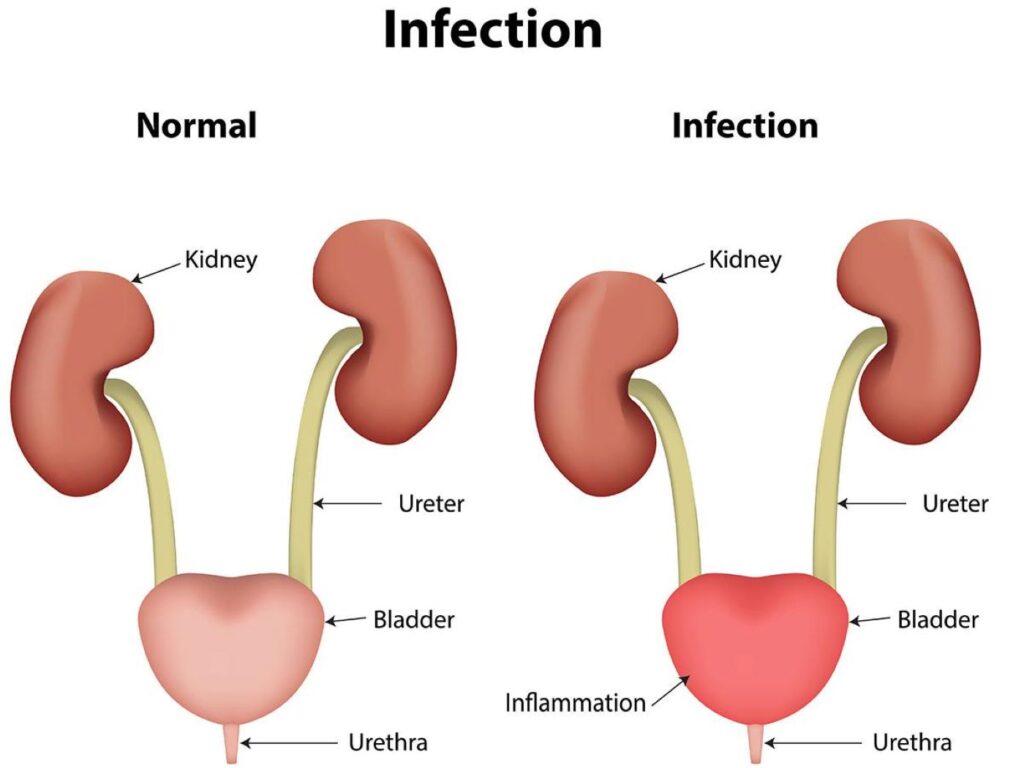Health Conditions
Find Out How Long a UTI Can Go Untreated
Do you have frequent urination, a burning sensation when peeing, and lower abdomen pain? These could indicate a urinary tract infection (UTI). UTIs are typically caused by bacteria entering the urinary tract via the urethra and affect both men and women.
But how long may a UTI remain untreated? Ignoring a UTI can cause problems and discomfort. If not treated, a UTI can spread to the kidneys, resulting in a more serious illness. Furthermore, untreated UTIs can become recurring, causing long-term discomfort and lowering your quality of life.
If you suspect you have a UTI, get medical assistance immediately. Your UTI will be diagnosed by a healthcare professional following a physical examination and urine tests. Antibiotics are often used to eradicate the illness and relieve symptoms.
Remember that early detection and treatment are critical for avoiding complications and successfully curing a UTI. Don’t ignore the symptoms; seek medical attention to ensure your health and well-being.
What is a UTI?
A urinary tract infection (UTI) is an infection that affects any component of the urinary system, such as the kidneys, bladder, ureters, or urethra. It is mainly caused by bacteria that enter the urinary tract through the urethra, such as Escherichia coli (E. coli). UTIs are more common in women because their urethra is shorter, allowing bacteria to enter the bladder more easily.
The most common type of UTI is a bladder infection, sometimes called cystitis. This infection predominantly affects the bladder and can cause symptoms such as frequent urination, a strong desire to urinate, a burning feeling while urinating, and murky or pungent urine. In more severe situations, a UTI can extend to the kidneys, resulting in pyelonephritis.

Symptoms of an Untreated UTI
If a UTI is not treated, the symptoms can develop, leading to additional issues. Untreated urinary tract infections can cause the following symptoms:
- Urinary frequency: You may feel compelled to urinate more frequently than normal, often passing only little volumes of urine.
- Persistent pain or discomfort: Lower abdominal pain or a sensation of pressure in the pelvis may be present.
- Burning sensation while urinating: Burning sensation while peeing is a frequent symptom of a UTI that can worsen if not addressed.
- Blood in the pee: Blood may be present in the urine, causing it to appear pink, red, or brown.
- Strong-smelling urine: Urine may have a strong, unpleasant odor.
- Fever and chills: If the infection extends to the kidneys, you may feel feverish, cold, and tired.
Risks and Complications of an Untreated UTI
Ignoring a UTI can have serious consequences. If the infection is not treated promptly, it can lead to various complications, including:
- Kidney infection: A UTI that spreads to the kidneys can result in a kidney infection, which can be more serious and necessitate more intensive treatment.
- Sepsis: In rare situations, a severe kidney infection can progress to sepsis, a potentially fatal condition in which the body’s response to infection causes widespread inflammation.
- Recurrent UTIs: Untreated UTIs can reoccur, resulting in repeated episodes of discomfort and associated consequences.
- Pregnancy problems: UTIs during pregnancy might raise the likelihood of preterm labor and other issues.
- Chronic kidney disease: Frequent UTIs that go untreated or are improperly treated can lead to the development of chronic kidney disease over time.

How Long Can a UTI Go Untreated?
The length of time a UTI can go untreated depends on a number of factors, including the individual’s immune system, the severity of the infection, and the presence of any underlying medical issues. In general, if you feel you have a UTI, you should consult a doctor very away.
Without treatment, a UTI can continue and worsen within a few days. If the infection spreads to the kidneys, the symptoms may worsen and the risk of consequences rises. It is critical to remember that everyone’s body reacts differently to infections, and delaying treatment might lead to serious complications.
When to Seek Medical Attention for a UTI
If you have any signs of a UTI, seek medical assistance right once. Please contact your healthcare provider if you observe any of the following:
- Frequent urination and a strong urge to urinate, even when you have little urine to pass.
- Pain or a burning sensation while urinating.
- Cloudy, dark, or strong-smelling urine.
- Lower abdominal pain or discomfort.
- Blood in the urine.
- Fever or chills.
Your healthcare provider will perform a physical examination and may request a urine sample for analysis. This will help determine whether you have a UTI and guide the appropriate treatment.
Home Remedies for UTI Relief
While seeking medical attention is crucial for treating a UTI, there are also some home remedies that can provide relief from symptoms:
- Drinking enough of water: Staying hydrated can help wash bacteria out of the urinary tract.
- Urinating frequently: Avoid keeping urine in for extended periods of time, as this allows bacteria to proliferate.
- Applying a heating pad: Place a heating pad on your lower abdomen to assist relieve pain and discomfort.
- Taking over-the-counter pain relievers: Nonsteroidal anti-inflammatory medicines (NSAIDs), such as ibuprofen, can aid with pain and inflammation.
These home remedies can provide temporary relief, but they should not replace medical treatment. It is important to consult with a healthcare professional for proper diagnosis and treatment.

Preventing UTIs
Prevention is always better than treatment when it comes to UTIs. Here are some tips to help reduce the risk of developing a UTI:
- Drink plenty of water: Staying hydrated helps dilute urine and flush out bacteria from the urinary tract.
- Urinate before and after sexual activity: This can help flush out any bacteria that may have entered the urethra.
- Wipe from front to back: After using the toilet, always wipe from front to back to prevent bacteria from the anal area from spreading to the urethra.
- Empty your bladder completely: Avoid holding in urine for long periods, as this can allow bacteria to multiply.
- Avoid irritants: Avoid using irritating feminine products, such as douches or powders, which can disrupt the natural balance of bacteria in the urinary tract.
When Antibiotics are Necessary for a UTI
In most circumstances, antibiotics are required to treat a UTI successfully. The antibiotic recommended will be determined by the severity of the infection as well as the specific bacteria responsible for it. It is critical to complete the entire course of antibiotics as prescribed, even if symptoms improve before the medicine is done. This helps to ensure that the infection is entirely removed, lowering the risk of recurrence.
It is crucial to highlight that overuse of antibiotics might result in antibiotic resistance, making subsequent infections more difficult to cure. As a result, antibiotics should only be used when absolutely required and as prescribed by a healthcare practitioner.

The Importance of Early Treatment for UTIs
Early detection and treatment of UTIs are critical for avoiding complications and effectively treating the infection. Ignoring a UTI or delaying treatment can cause the infection to spread to the kidneys, resulting in more severe symptoms and perhaps requiring more harsh treatment.
If you feel you have a UTI, don’t be afraid to seek medical help. A healthcare expert can diagnose the illness and administer the necessary medication to reduce symptoms and prevent complications. Remember that your health and well-being are worth prioritizing.
Conclusion
Ignoring a UTI might lead to catastrophic consequences. If left untreated, a UTI can spread to the kidneys, resulting in recurring infections and complications like sepsis and chronic renal disease. Seeking medical attention right away is critical for receiving an accurate diagnosis and treatment.
Remember to drink lots of water, urinate frequently, and maintain good hygiene to help prevent UTIs. If you have signs of a UTI, seek medical assistance right once. Early detection and treatment are critical to successfully resolving a UTI and avoiding future problems. Prioritize your well-being and maintain good urinary health.
Trusted Health, Wellness, and Medical advice for your well-being


